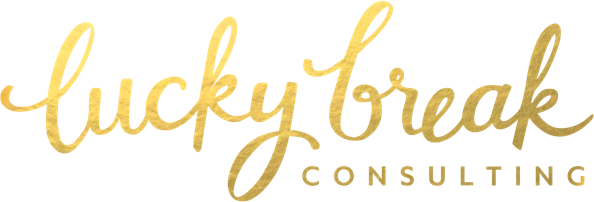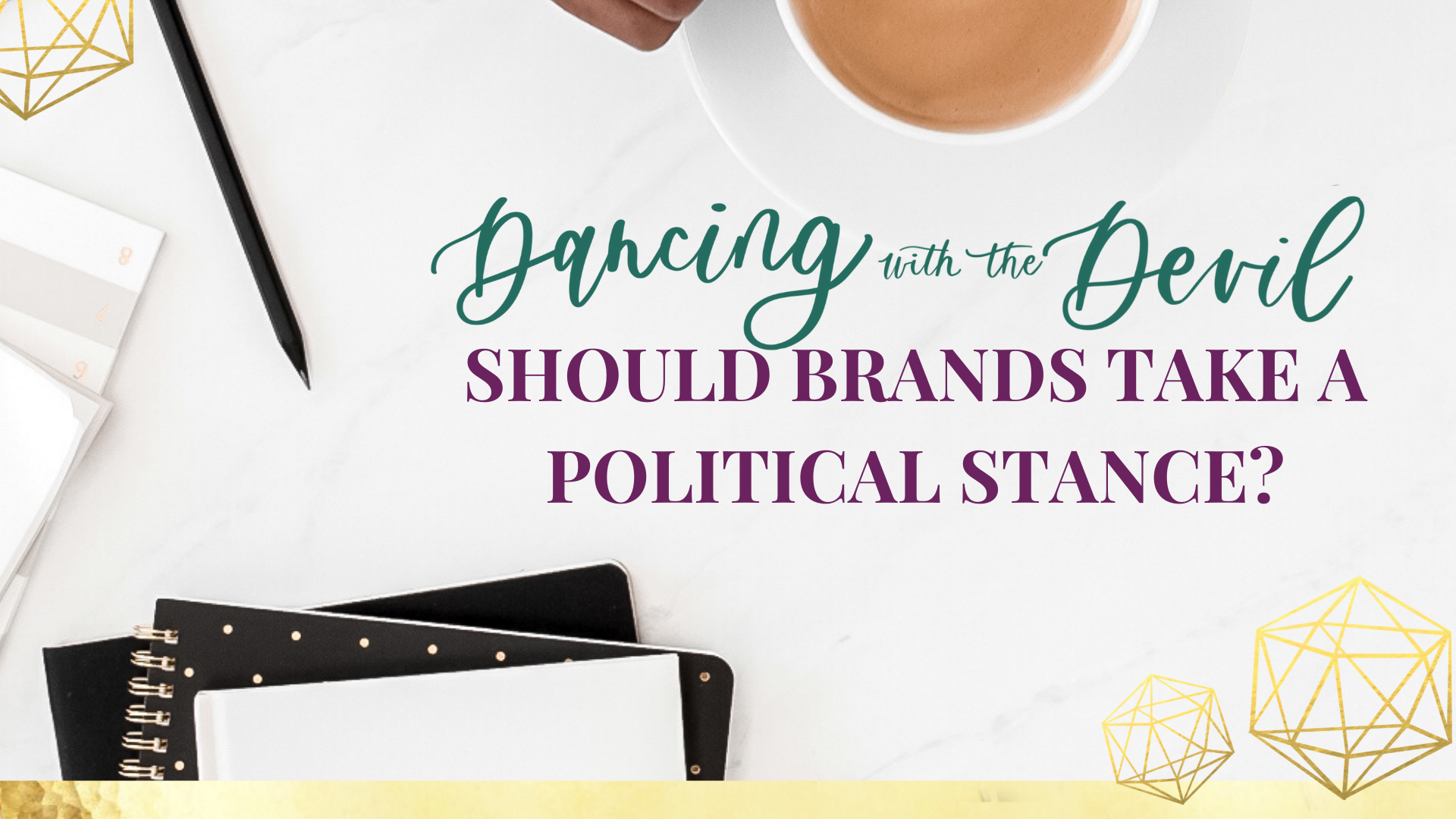Having been raised in the South, my mother taught me never to speak of three things in polite company: money, religion, and politics. I’m about to break that rule in spectacular fashion as we explore whether or not brands should take a political stance- y’all pray for my mama! The week that gave us both an impeachment vote and a State of the Union address seems to be a particularly dicey time to spark a conversation about politics, but I’m nothing if not brave.
I think that everyone is entitled to an opinion, but so many are uninformed opinions. I don’t need a star or a brand who knows little about economics and the real world trying to convince me that I should just trust their beliefs which are almost exclusively based on their feelings. Just sell me the chips, music, sport, whatever.
-a member of the Lucky Break community
An Abbreviated History of Brands Taking a Political Stance
Just a decade or two ago, brands held their political leanings close to the chest, operating on the belief that taking a political stance would negatively impact revenue and hopelessly divide their customer base. But if 2019 taught us anything, it’s that brands are increasingly willing to co-mingle business and politics. And that willingness to get political is coming from all sides- Black Rifle Coffee Company earned a plug from Donald Trump after vowing to hire 10,000 veterans in a trolling response to Starbucks’ announcement that they’d hire 10,000 refugees. On the flip side of the coin, Penzey’s Spices embraces a particularly outspoken stance against the Trump administration, to the tune of $700,000 worth of pro-impeachment ads.
Peel back the curtain, and all kinds of brands are making their political feelings known, especially artisan brands that lean left of center. Emily McDowell shared her version of American values on a popular tote bag while saluting #44 via her “I miss Obama” postcard book. Meanwhile, Sapling Press launched a spicy anti-Trump greeting card collection that pulls no punches in sharing what they think of #45.

Sprinkled amongst the custom illustrations of smiling families, artist Jennifer Vallez’s work includes RBG dolls and mugs emblazoned with Nancy Pelosi tearing up the latest Trump SOTU speech. Acclaimed potter Ayumi Horie rallied the ceramics community to launch The Democratic Cup in the wake of the 2016 presidential election. Now more than ever, people are ignoring my dear mother’s advice and dabbling in consumer activism, encouraging their audiences to vote with their dollars and donating to nonprofit organizations in a move that sometimes tips their political hand.
But should brands take a political stance? With the risk of diminished revenue and the likelihood of (*ahem*) “spirited” commentary on their Instagram feeds, is it wise to endorse a social issue, a piece of legislation, or a particular candidate? Why would a brand owner risk swift backlash to voice their political opinions publicly? I asked the Lucky Break community to weigh in, and I’m weaving their comments into this discussion. I’ll also share the full results of my recent survey in an upcoming post, which continues our exploration of what happens at the intersection of business and politics.
I’m turned off by brands that seem to monetize a trendy slogan through their products, such as the many “She persisted” products that have emerged. Even though that more or less aligns with my political beliefs, it’s a fast sales tactic, and it seems phony. That makes me dislike a brand instantly.
a member of the Lucky Break Community
Why artisan brands might make a political statement
I’ve watched with wonder over the last decade as once-taboo subjects in marketing have begun creeping onto the center stage. Controversial social issues and political discussions were once the kiss of death for a company’s marketing. In 2020, it no longer is for many. But I recognize that many brand owners (maybe even most others) are still uncomfortable and prefer to keep their choices as a consumer untethered to their political leaning.

This new-found willingness to blend politics and consumerism is especially pronounced within the artisan community. Makers often appear eager to express personal ideals and interests via their professional microphones. I believe that this shift is a natural evolution of the discussions we’ve long been hosting with our customers.
- How things are made matters.
- People above profits.
- Vote with your dollars.
- Local is best.
These are the very same conversations we’ve been igniting and stoking for the last decade! We’ve been asking people to explore how their purchases impact the broader economy and humanity in general. We’ve been calling upon them to pay a premium for ethically made, eco-conscious goods. As a community, we’ve long celebrated putting ethics above dollars. In fact, we cultivated the concept of consumer activism that’s begun to force giant corporations to show their hands.
No one should feign shock when they wade into artist waters and discover that we’re an opinionated bunch that consumes news like it’s our job. After all, presidential debate nights are our Superbowl Sunday.
As a business owner, in “normal” times, I would not be vocal about my views. However, these are not normal times. Those of us who can MUST speak up. I am a woman and an immigrant. The policies of the current administration are abhorrent to me. I’ve lost a few customers, but my business is thriving overall.
a member of the Lucky Break community
What effect does politics have on brands?
This penchant for political discussions has caught the eyes (and ears) of multinational corporations who appear to be sitting up a bit straighter in their chairs lately.
There’s an entire database devoted to helping consumers avoid brands that have a financial relationship with Donald Trump. In a particularly bold move, Nike hopped into bed with Colin Kaepernick, the NFL’s most controversial star. A national outcry ensued, complete with a flood of videos showing people gleefully burning collections of Nike gear. But the suspected evaporation of profits has yet to materialize. The collaboration has paid off for Nike’s bottom line, with soaring profits that have added $6 billion in value to Nike’s brand portfolio.

It works in the opposite, too. Last fall, the chairman of Equinox and SoulCycle hosted a fundraiser for Trump in the Hamptons with ticket prices topping $250,000. That news ignited a firestorm of controversy, primarily because those two fitness franchises have actively recruited the LGBTQ+ community. Many members felt betrayed to learn that their membership fees were supporting a candidate with a track record that’s decidedly unfriendly to their community. The result? Another wave of national outcry that resulted in a noticeable dip in attendance at SoulCycle.
The PR and financial implications of political stands are seemingly everywhere these days, with clear winners and losers. Chick-fil-A (the fifth food group for many of my Southern peers) is routinely criticized for its contributions to nonprofit organizations that are decidedly anti-LGBTQ+. Recent protesters were so vociferous that the chain announced plans to shutter their first UK location just eight days after it opened. Uline, a shipping materials supplier that’s widely known in the artisan community, was recently christened “The Beauty Industry’s SoulCycle” because its owners are some of the country’s largest financial donors to the Trump campaign.
Even though I like to know a brand’s political leanings, I forbid politics on my social media and blog. It’s become overwhelmingly divided, and people get downright ugly, which helps no one. I’d rather promote positivity in my business rather than contributing to the divide.
a member of the Lucky Break Community
Do personal political beliefs shape consumerism?
At the end of the day, do we actually care what brands think? Indeed, we do. I’ve been semi-obsessively tracking this issue for more than a year. This week, I had an opportunity to hear from several hundred consumers and brand owners within the Lucky Break community. And one thing is abundantly clear: we care where brands stand on issues we deem important. That was close to unanimous, regardless of party affiliation. But things diverge from there. When I isolated the responses according to where respondents fell on the political spectrum, a few patterns emerged.
Those who lean firmly to the right spoke of feeling like Hollywood, the media, and brands paint them with too broad a brush as racists and bigots. They’re frustrated at the perceived misconception. They were more likely to indicate that the recent shifts in marketing protocol revolve around brands speaking out less, not more. And they more frequently mentioned political fatigue.

Those who lean strongly left often indicated that they view current discussions through the lens of personal values rather than politics. They perceive things like fair wages, reproductive rights, and sexual and gender equality as human rights issues they can’t ignore. The Trump administration, in particular, feeds their fear and dozens of survey respondents indicated that they didn’t mix business and politics until Trump was elected. Now, they see silence as an ethical betrayal, and their values compel them to speak up.
It will be interesting to see if brands recede from politics once Trump is out of office. Just as those “temporary fuel surcharges” sneakily become permanent, I suspect that the rise of consumer activism is here to stay. I wouldn’t be the least bit surprised if the increased intersections between politics and business outlive the current administration.
I do vote with my dollars. There are products and companies that I avoid because of their political or social leanings. Conversely, there are places I do patronize because they align with my values.
a member of the Lucky Break community
Why would a brand take a political stand?
So if we all agree that brands sharing their political opinions is akin to hopscotching across hot lava, why in the hell are modern brands so eager to lace up their sneakers and tango with Lucifer? I think that are two catalysts at play:
1. Some brand owners are genuinely terrified about the country’s direction. Few politicians are as ambitious as the current administration, and that ambition has enflamed passions. Small businesses have the freedom and flexibility to be more vocal, and the current marketplace has empowered them to speak up. They’re scared, and they feel compelled to take action.

2. Other brand owners know a promising marketing opportunity when they see one. In Brick House Branding, my 9-week brand development mentorship, we focus on creating differentiation in the marketplace and seeing everything through the lens of our ideal customer. If you’ve strategically built an audience, then you can likely predict how they feel about particular social issues and political candidates. Tapping into their passion and leading them on issues of importance drives revenue. It’s a delicate dance, but it can be quite successful when it’s artfully navigated, as some brands have discovered.
Too much of what is really humanity and equality is seen as political leaning. I voice my politics (morals), and I spend money at businesses that reflect my interest in an equal pay/ LGBTQ safe/ pro-choice/ trans-loving world that wants to clean up our environment and halt climate change.
a member of the Lucky Break Community
What’s your take?
Should brands take a political stance? Have you noticed a shift in how businesses are approaching politics in the modern landscape? Is that a positive or negative transition? Have your purchasing decisions been influenced by a brand’s stance on political or social issues? Please drop a comment below- I’d love to add your voice to this discussion! If we could avoid debating actual candidates and policies, then I’m confident that our conversation will be more fruitful. I’m hoping to host a meaningful discussion on consumer activism and evolving marketing practices, rather than on whether or not Trump deserves re-election. *wink*






I think people like to know where their dollars are going to a certain extent, but they don’t want it shoved in their faces, especially when that has not been the forefront of the brand voice and POV to start.
What is terrible is right now we live in a world of binary choices. You are either for or against. The middle is eroding away. So when my husband and I discussed this very topic, he said something poignant. It’s great that brands want to be transparent and speak to their people, but how does that help society as a whole. Does that drive us further apart by creating siloed groups and leaving less opportunity for open and thoughtful discussion? Or does that bring us closer to the people who align with our values?
I can’t wait to see part two of this piece.
Your husband is spot on! We are getting more and more divided and people tend to live in an echo chamber (hearing only what they want to hear) instead of civil discourse with people who may have different viewpoints. People are becoming so nasty. Very sad.
Ah yes.. echo chamber was the exact words he used! And it’s true. The issues we are facing are so complex that it’s doing a disservice to everyone to overgeneralize and have this “them versus us” mentality. I think it gets tough when that spill over into other areas like consumerism. Thanks Lauri!
Perfectly timed and beautifully written as usual!
Thanks, Lela!
When you put the response to your haters right on your package! Here’s Oatly laying out why they WON’T stop talking about politics and just stick to their products, because politics is at the heart of why their products exist in the first place. Read this over my morning coffee and thought of you, Lela Barker, and this article. Reading their longform response really endeared me to their brand. It’s not just a political opinion, it’s a mission they will stand by through it all. Talk about owning it.
” ‘Stick to Oat Milk.’ We get it often. “Why don’t you just shut up about what you think and focus on your own products.” Well, if your only reason for being is to make money for your shareholders, then that is a generic and safe strategy, but it is certainly not ours. If you want to build a better society for people and work to ensure the planet we live on continues to live past our limited time here, then is makes perfect sense to share what we think is important, like treating people equally and fairly, producing food that is nutritious and sustainable, and opting for plants over animals as a source of nourishment. If that’s not something you are into, that’s okay. Freedom is a wonderful thing.”
https://www.oatly.com/int/about-oatly
If a brand is so outspoken, my purchase seems like an affirmative vote, I’ll pass. I may not buy, depends on the need, just because 5% goes to such and such. I have my charities and groups I choose to support. Don’t need you to get my charitable giving done. Younger generation may feel differently if they are not contributing individually.
I would definitely buy from a brand that reflected my values and avoid businesses that don’t. That said, I’m keeping politics out of my brand and going for the broad interest group who likes traveling. I noticed that IN-N-OUT Burger has Bible references on their packaging and cups. I’m not a Bible reader, but I don’t mind the references because they’re not in my face. It’s kind of thoughtful that way.
If political means the express support of one particular party over others then it seems odd to have in the extreme, say a bath bomb with a GOP sticker on it – no matter my personal leanings that would be a turn off to purchase.
However the fuller meaning of ‘political’ being simply about what affects people I think is important to disclose by the producer and important to research by the consumer. Issues of human rights, environmental concern, etc. are political because they involve people, not because one party presents a for or against position.
Fair Trade for example is about transparency at all levels of producing everything we eat, wear and use. I’ll promote awareness with my brand and support brands with like values. I will not for example, buy Nestle, Mars, Hershey chocolate products because children are exploited in harvesting the cocoa – but I only know this through research – obviously it’s not a selling point of the brands! My passion for fair trade to be an active choice for more and more people is just that, and people can align with it or not.
I’m working towards a day when the shift happens and goods will have to be labelled ‘NOT FAIR TRADE’ – Now, a political party with that on their platform my just get their sticker on my stuff 😉
Angie Chua took the words out of my mouth. I’ll expand on it by saying that we’ve created a vast series of siloed echo chambers, where we only listen to the voices that agree with us and cover our ears and sing “Mary Had a Little Lamb” whenever we perceive a counterargument. Reason, critical thinking, logic, FACTS – these all seem to be viewed as enemies of free thinking or attacks on free speech, depending on which way the argument leans. As strongly as I feel about issues today, I’d rather promote those things that bring us together and remind us that we’re really, truly, not all that different, if we just shut up and really listen to each other once in a while.
I am divided against myself on this issue. Sometimes I buy former brand knowing that they value very different things than I do and our values actually conflict with each other. Other times, I have absolutely no problem going to extreme lengths to cut brands (and musicians for that matter) out of my life (and out of my playlist) because of their outspoken opinions.
For most of my life I have been a deep blue dot in a sea of red, so it is uncomfortable for me to speak out as an individual and also as a brand. To compensate for that I make sure my values are clearly displayed because I feel so strongly that like-minded individuals are drawn towards brands that demonstrate their values even if that brand chooses not to discuss politics.
Whether I agree with them or not, I’m grateful when I know a business’s political compass. It allows me to make a choice, and I am pro-choice on all levels. Bravo to Penzey Spices, I applaud them for their transparency.